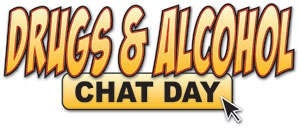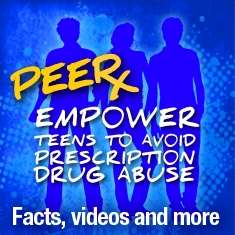- The Addiction Performance Project
The Addiction Performance Project (APP) was a medical education program to help break down the stigma associated with addiction. Professional actors read from Act III of Eugene O’Neill’s Pulitzer Prize and Tony Award winning play Long Day’s Journey into Night then an expert panel responds to the reading. From 2011-2013, the APP was only a live audience event. In May 2013, the online version of this program was launched. The APP was developed and produced in partnership with Outside the Wire, LLC, and with the medical consultation from Elizabeth Gaufberg, MD, Harvard Medical School.
- The Addiction Science Award
-
The Addiction Science Award was coordinated by the Friends of NIDA, a coalition that supports NIDA's mission. With scientific expertise from NIDA, the awards were given to three exemplary projects on the topic of addiction science. It was part of the Intel International Science and Engineering Fair (ISEF), the world's largest science competition for high school students.
- Drug & Alcohol Chat Day
-
2007–2019

Drugs & Alcohol Chat Day provided students the opportunity to ask leading researchers questions about drug use and addiction, as well as the associated health effects and risks.
- HBO Addiction Project

Produced by HBO in partnership with the Robert Wood Johnson Foundation, the National Institute on Drug Abuse (NIDA) and the National Institute on Alcohol Abuse and Alcoholism (NIAAA), the Addiction Project combines film and leading scientific research to shed light on the current state of addiction in America.
The HBO documentary called Addiction, first aired March 15, 2007. The 90-minute program, produced in partnership with the Robert Wood Johnson Foundation, the National Institute on Drug Abuse (NIDA), and the National Institute on Alcohol Abuse and Alcoholism (NIAAA), is aimed at helping Americans understand addiction as a treatable brain disease, as well as spotlighting new medical advancements.
 NIAAA Director Dr. Ting-Kai Li, NIH Director Elias Zerhouni, M.D., NIDA Director Dr. Nora Volkow with the Emmy Awards from the HBO Addiction project
NIAAA Director Dr. Ting-Kai Li, NIH Director Elias Zerhouni, M.D., NIDA Director Dr. Nora Volkow with the Emmy Awards from the HBO Addiction projectThe documentary explores many elements of drug and alcohol addiction, through the eyes of those who are addicted and those of the scientific experts working to better understand and treat this devastating disease.
Along with the film, this campaign includes community outreach, 13 additional segments about addiction and a web site that provides additional information about addiction. To view, go to https://www.hbo.com/documentaries/addiction (Dr. Nora Volkow's segment is 39:09 - 43:30).
Robert Wood Johnson Foundation has funded community activities that will be carried out around the country by Community Anti-Drug Coalitions of America (CADCA), Faces and Voices of Recovery, and Join Together. They will conduct group events around the airing of the programs. There are some 30 communities targeted. More information about community events can be found on www.AddictionAction.org.
NIDA has released Drugs, Brains, and Behavior - The Science of Addiction to complement this documentary on Addiction.
Two NIH Institutes Share Emmy Award for HBO's The Addiction Project (9/16/07)
- Learn the Link - Drugs and HIV
Behaviors associated with drug misuse are among the main factors in the spread of HIV infection in the United States.
Drugs can change the way the brain works, disrupting the parts of the brain that people use to weigh risks and benefits when making decisions.
- NIDA's Lifetime Science Awards
-
NIDA’s Lifetime Science Award is given annually to researchers who have dedicated their careers to addiction science; whose lifetime work has led to new treatment and prevention strategies; and whose personal commitment and scientific endeavors have inspired others in the field.
2017
Dr. A. Thomas McLellan

NIAAA and NIDA are pleased to offer the first jointly sponsored NIAAA-NIDA Lifetime Science Award to Dr. A. Thomas McLellan for his outstanding contribution to the field of alcohol and drug research. Dr. McLellan has been a career researcher for 35 years at the Treatment Research Institute (which he founded in 1992) and professor of psychiatry at the University of Pennsylvania. In the 1980s, with his colleagues from the Center for the Studies of Addiction at the University of Pennsylvania, Dr. McLellan introduced the Addiction Severity Index and, later, the Treatment Services Review. Both are among the most widely used assessment instruments in the world. In 1992, he co-founded and led the Treatment Research Institute to transform the way research is employed in the treatment of and policymaking around substance use and abuse.
Dr. McLellan has published more than 450 articles and chapters on addiction research and has been a principal investigator (PI) or co-PI on 150 federal grants. From 2000 to 2009, he was editor-in-chief of the Journal of Substance Abuse Treatment, and he has also served on several other editorial boards of scientific journals. Most recently, he served as the senior scientific editor for the first-ever Surgeon General’s Report on Alcohol, Drugs, and Health, considered by both federal and nonfederal stakeholders to be a monumental milestone.
In his career, Dr. McLellan has received several distinguished awards, including the Life Achievement Awards of the American and British Societies of Addiction Medicine (2001 and 2003), the Robert Wood Johnson Foundation Innovator Award (2005), and awards for Distinguished Contribution to Addiction Medicine from the Swedish (2002) and Italian (2002) Medical Associations.
Dr. McLellan is the former deputy director of the White House Office of National Drug Control Policy (ONDCP), a congressionally confirmed presidential appointment to help shape the Nation’s public policy approach to illicit drug use. At ONDCP, Dr. McLellan worked on a broad range of drug issues, including formulation and implementation of the president’s National Drug Control Strategy and promotion of drug treatment through the broader revamping of the national health care system. Dr. McLellan received his B.A. from Colgate University and his M.S. and Ph.D. from Bryn Mawr College. He received postgraduate training in psychology at Oxford University. He has since worked for the Veterans Administration Medical Center in Philadelphia and the University of Pennsylvania.
2015
Charles O'Brien, MD, Ph.D.

NIDA is pleased to offer its 2015 Lifetime Science Award to Dr. Charles O'Brien, one of the world’s most prominent addiction researchers and a NIDA grantee for many years. Over the past 30 years, Dr. O'Brien has made many important discoveries and contributions that have become the standard of care in addiction treatment across the globe. O’Brien was co-developer of the Addiction Severity Index, a tool now used worldwide to assess the extent of patients’ substance use disorders. He was also the first to test the use of the opioid antagonist naltrexone in the treatment of alcohol addiction, following his theory that alcohol reward was mediated by endorphins. Aside from developing medications to treat alcohol, opioid, and cocaine dependence, he has also done crucial research increasing the understanding of the clinical aspects of addiction and the neurobiology of relapse.
Among his numerous honors, Dr. O'Brien was elected to the Institute of Medicine of the National Academy of Sciences in 1991 and received the Nathan B. Eddy award for research from the College on Problems of Drug Dependence in 2003. He has advised the United States government on drug policy for decades and has chaired or served as a member of many Institute of Medicine committees dealing with science and drug abuse policy matters. He was the President of the American College of Neuropsychopharmacology and the Association for Research in Nervous and Mental Disease.
Dr. O'Brien is the Vice-Chair of Psychiatry at Penn, and the Director of the prestigious Center for Studies in Addiction. He is board-certified in psychiatry, neurology and addiction psychiatry and leads the Charles O’Brien Center for Addiction Treatment at the Perelman School of Medicine at the University of Pennsylvania. Dr. O’Brien received his MD and PhD degrees from Tulane University and received residency training in psychiatry, neurology, and medicine at Harvard, the University of London, Tulane and the University of Pennsylvania.
2014
Mary Jeanne Kreek, MD

NIDA is pleased to offer its 2014 Lifetime Science Award to Dr. Mary Jeanne Kreek for her world-renowned contribution to the advancement of addiction science. A longtime NIH/NIDA grantee, Dr. Kreek was part of the team that performed the initial studies of the use of methadone in chronic management of heroin addiction. In collaboration with the CDC, she was the first to identify parenteral drug users as the second risk group for acquiring HIV-1/AIDS infection.
Dr. Kreek documented the role of the endogenous opioid system in cocaine, alcohol and heroin addiction, including the role of mu opioid receptor-endorphin peptides in the “rewarding” effects and the countermodulatory effects of kappa opioid receptor-dynorphins. Her group also identified multiple novel polymorphisms in the coding and non-coding regions of human mu and kappa opioid receptor genes and shown associations of these genes, as well as those for dynorphin and enkephalin, with opioid, cocaine, and alcohol addiction. Her lab has also discovered over 20 addictive gene variants associated with opioid addiction and is currently studying functional specific gene variants and selected epigenetics questions in humans and rodents. In the lab, Kreek also studies the effects of several kappa gene regulatory agents including agonists, partial agonists, and antagonists and is working on new pharmacological agents.
Dr. Kreek has authored or co-authored more than 350 peer-reviewed research papers and over 150 invited concept reviews and reports. She has received several awards for her scientific research, including the Betty Ford Award from AMERSA (1996), and the R. Brinkley Smithers Distinguished Scientist Award and Lecture of ASAM in 1999. She is a graduate of Wellesley College and also of the Columbia University College of Physicians & Surgeons, where she received her medical degree. She is Patrick E. and Beatrice M. Haggerty Professor and Head of the Laboratory of the Biology of Addictive Diseases at The Rockefeller University, and Senior Physician of The Rockefeller University Hospital.
- NIDA Media Campaign Postcards
These postcards, produced by NIDA beginning in 2005, focus on the dangers related to the abuse of specific types of drugs and the dangers of drug addiction in general
- NIH K-12 Lab Challenge Winning Experiments
-
In 2011, the National Institutes of Health’s K-12 Lessons About Bioscience (LAB) Challenge asked teachers, students, parents, scientists, and science enthusiasts to submit their favorite experiments for elementary, middle, and high school students. See the winning experiments.
- PEERx - NIDA for Teens
-

Please note: PEERx has been discontinued and will no longer be updated.
PEERx was a free, online initiative designed to educate teens in grades 8-10 on the dangers of prescription drug misuse. The centerpiece of this initiative was "Choose Your Path," an interactive video that allowed the viewer to assume the role of the main character to "call the shots" in the story and watch the drama unfold. Other features of PEERx included an activity guide with step-by-step instructions for teens, fact sheets, colorful downloads that could be made into iron-on t-shirt decals, stickers, posters, and wallpapers.
See Prescription Drug Misuse: Choose Your Path Interactive Videos.
- Scholastic
-
Since 2002, NIDA and Scholastic Inc. have partnered to create Heads Up: Real News About Drugs and Your Body. This and science-based education series provides teachers and students with innovative resources about the effects of drugs, drug use, and addiction on the brain and body. New teen articles, classroom lessons, and student worksheets are created and distributed every school year through Scholastic’s in-school magazines, as well as Heads Up teacher. and student websites. This collaboration ended in 2021
View more about the Scholastic and NIDA Collaboration
- Science Education Drug Abuse Partnership Award Program (SEDAPA)
-
The National Institute on Drug Abuse funded new grants through its Science Education Drug Abuse Partnership Award from 1992-2013. The purpose of the SEDAPA program was to fund the development and evaluation of innovative programs and materials for enhancing knowledge and understanding of neuroscience and the biology of drug abuse and addiction among K-12 students, the general public, health care practitioners, and other groups.
Past Public Services Campaigns
- Jack & Jill (Keep your Body Healthy)
-

Launched - November 2001
"Jack & Jill," the first installment in our "Keep Your Body Healthy" campaign, illustrates for adolescents and young adults the harmful risks associated with engaging in risky sexual activities and the connection between drug abuse and contracting HIV/AIDS.
Television PSA, 30-second spot
Radio PSAs, 30-second spots
- Game Plan (Keep Your Body Healthy)

Launched - February 2002, Relaunched - June 2005
"Game Plan," the last installment in our "Keep Your Body Healthy" campaign, encourages young men and women to work with what nature has provided and not "cheat" by using steroids and exposing themselves to the negative side-effects associated with these drugs..
Television PSAs, 60-second spots
English
Spanish
- Keep Your Brain Healthy

"Keep Your Brain Healthy" uses scientific data to explain the effects of drug use on the brain and encourages parents to talk to their children about the dangers of drugs.
Television PSAs, 30-second spots
English
Spanish

